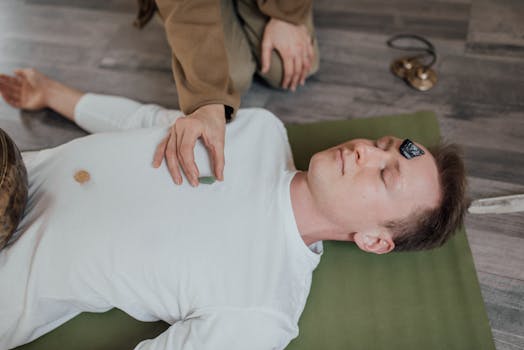
Finding Your Calm: A Guide to Mindfulness and Meditation
In today's fast-paced world, stress and anxiety are commonplace. Finding moments of peace and tranquility can feel like a luxury, but it's actually a necessity for our mental and physical well-being. Mindfulness and meditation offer powerful tools to navigate the challenges of modern life and cultivate inner peace. This article explores the benefits, practices, and common misconceptions surrounding these ancient yet increasingly relevant techniques.
What is Mindfulness?
Mindfulness is the practice of paying attention to the present moment without judgment. It's about observing your thoughts, feelings, and sensations as they arise, without getting carried away by them. Instead of dwelling on the past or worrying about the future, mindfulness anchors you in the here and now. This simple act of awareness can have profound effects on your mental and emotional state.
What is Meditation?
Meditation is a formal practice of mindfulness. It involves sitting quietly, focusing on a specific object (like your breath, a mantra, or a visualization), and gently redirecting your attention when your mind wanders. There are numerous forms of meditation, each with its unique approach, from the focused attention of Samatha-vipassana to the compassionate focus of loving-kindness meditation.
The Benefits of Mindfulness & Meditation:
The benefits of incorporating mindfulness and meditation into your daily life are extensive and well-documented:
- Stress Reduction: Regular practice can significantly reduce stress hormones like cortisol, leading to a calmer and more relaxed state.
- Improved Focus and Concentration: By training your mind to stay present, you improve your ability to focus on tasks and resist distractions.
- Enhanced Emotional Regulation: Mindfulness helps you observe your emotions without being overwhelmed by them, allowing you to respond more skillfully to challenging situations.
- Better Sleep: Practicing mindfulness before bed can help quiet the racing mind and promote restful sleep.
- Increased Self-Awareness: By paying attention to your inner world, you gain a deeper understanding of your thoughts, feelings, and behaviors.
- Improved Physical Health: Studies have shown a link between mindfulness and reduced blood pressure, improved immune function, and pain management.
- Increased Empathy and Compassion: Mindful practices can cultivate a sense of connection with others and foster feelings of empathy and compassion.
- Start Small: Begin with just 5-10 minutes of daily practice. Consistency is key, rather than lengthy sessions.
- Find a Quiet Space: Choose a comfortable and quiet environment where you can relax and focus.
- Focus on Your Breath: A simple yet effective way to begin is to pay attention to the sensation of your breath entering and leaving your body.
- Body Scan Meditation: Bring awareness to different parts of your body, noticing any sensations without judgment.
- Guided Meditations: Numerous apps and online resources offer guided meditations to help you get started.
- Mindful Activities: Incorporate mindfulness into your daily activities, such as eating, walking, or listening to music. Pay close attention to the sensations and experience the present moment fully.
- Be Patient and Kind to Yourself: Your mind will wander. That's perfectly normal. Gently redirect your attention back to your chosen focus without self-criticism.
- Meditation is about emptying your mind: This is a common misconception. The goal isn't to achieve a blank mind, but to observe your thoughts without judgment.
- You need to be perfect: There's no such thing as perfect meditation. Embrace imperfections and continue practicing with kindness and patience.
- It takes years to see results: While consistent practice yields greater benefits over time, you can experience positive effects even with short, regular sessions.
- Meditation is only for spiritual people: Mindfulness and meditation are secular practices that can benefit anyone regardless of their beliefs.
Getting Started with Mindfulness & Meditation:
You don't need any special equipment or expertise to begin. Here are some simple steps to integrate these practices into your daily routine:
Common Misconceptions:
Conclusion:
Mindfulness and meditation are powerful tools for improving your mental and physical well-being. By incorporating these practices into your daily life, you can cultivate inner peace, reduce stress, and enhance your overall quality of life. Start small, be patient with yourself, and enjoy the journey towards a calmer, more mindful you. Explore the various techniques, find what resonates with you, and discover the transformative power of presence. Your mind and body will thank you for it.

